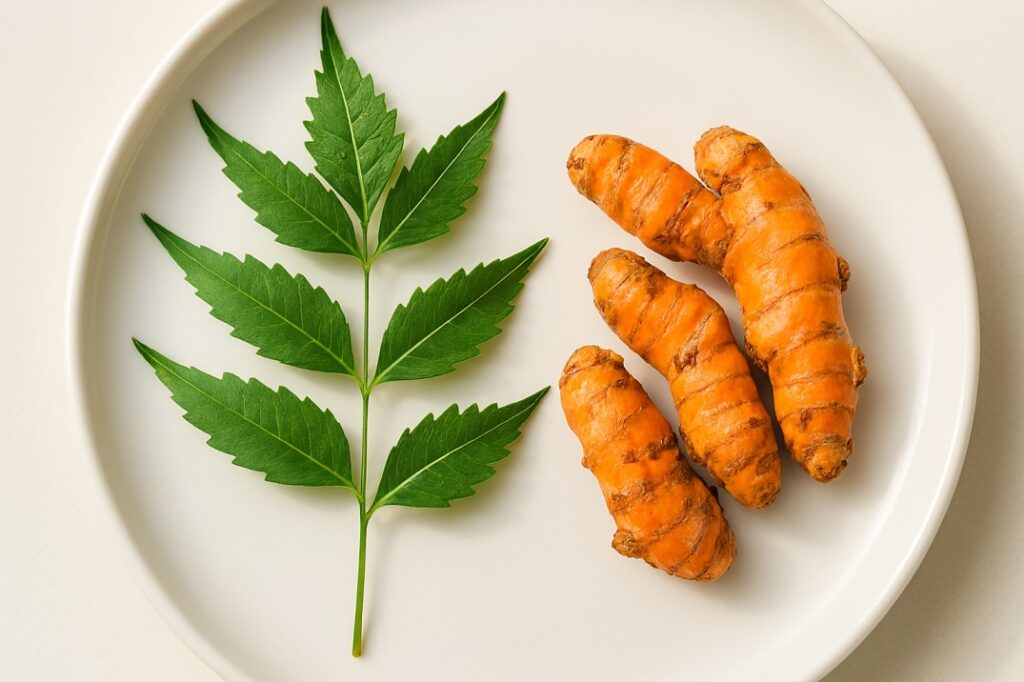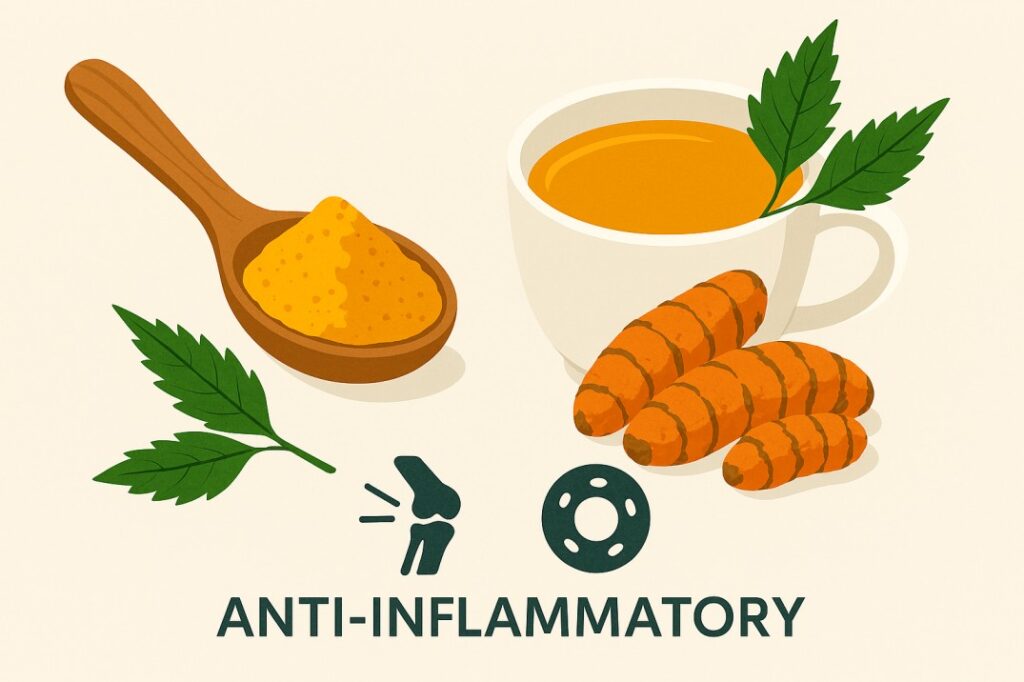
Neem and turmeric empty stomach health benefits
Learn 8 science-backed reasons to take neem and turmeric on an empty stomach, plus safety tips and FAQs for smart daily use.
Neem and Turmeric Empty Stomach: Simple Guide to Health
Neem and turmeric have been used in traditional medicine for a long time. Today, science is catching up. Both plants contain active compounds that support immunity, digestion, and the control of inflammation. Taking them on an empty stomach can sometimes improve absorption and effects. Below are eight reasons — explained simply and with practical tips.

What does “neem and turmeric empty stomach” mean
Taking neem and turmeric on an empty stomach usually means consuming them first thing in the morning, before food. People do this to try to help the body absorb active compounds faster. However, not everyone should take them this way. I’ll explain why and how to do it safely.
1. Faster absorption of active compounds
When your stomach is empty, drugs and herbal compounds often enter the intestine faster. Turmeric contains curcumin, which is the main active compound. Curcumin is poorly absorbed when taken with heavy meals. On an empty stomach, it can reach the gut and be taken up more quickly — especially if paired with black pepper (piperine). Studies show that piperine markedly increases curcumin absorption. PMC, Healthline
Neem’s bioactive components (from leaves and bark) are also more available when not competing with heavy food, which can help the body use them right away. PMC, ScienceDirect
2. Better digestion and gut balance
Turmeric can stimulate bile production and aid digestion. This helps the body break down fats and improves gut motility. Neem has mild antimicrobial effects that can help keep harmful microbes in check in the gut. Together, when taken on an empty stomach, they may prime the digestive system for the day. However, if you have GERD or a sensitive stomach, be cautious. PMC, Frontiers
3. Anti-inflammatory start to the day

Curcumin in turmeric is a powerful anti-inflammatory molecule. Taking turmeric early may reduce the body’s inflammatory signals sooner, which can be beneficial for people with chronic inflammation or joint pain. Neem also has anti-inflammatory actions and may add to the effect. Several reviews and studies support curcumin’s anti-inflammatory benefits. PMC+1
4. Support for blood sugar control
Research indicates neem extracts can help lower fasting blood glucose and improve glucose tolerance. Turmeric and curcumin also show potential for modest blood sugar benefits. Taking neem and turmeric before breakfast may support early-day glucose regulation — especially helpful for people watching their blood sugar. Still, never stop prescribed diabetes meds without talking to your doctor. PMC+1
5. Antimicrobial and oral-care benefits

Neem is famous for its antimicrobial power. It’s used in toothpaste and mouth rinses for a reason. Taking neem (or using a neem extract in the morning) can help reduce harmful oral bacteria before you eat. Turmeric also has antimicrobial properties and can support oral health. This early action can reduce bacterial load throughout the day. Frontiers, PMC
6. Liver support and detox pathways
Both turmeric and neem contain compounds that have shown hepatoprotective (liver-protecting) effects in lab and animal studies. Taking them in the morning can help the liver get an early boost in antioxidant and detox pathways. While “detox” is an oversimplified word, there is evidence that these herbs support normal liver function. PMC, Annals of Translational Medicine
7. Immune system priming
Curcumin and neem compounds modulate the immune system. Consuming them on an empty stomach may allow quick interaction with gut-associated immune cells. This can be a gentle way to support immune balance without overloading the system. Again, this is complementary care — not a replacement for vaccines or medical treatments. PMC, Frontiers
8. Morning ritual and consistent dosing
Finally, the practical reason: routine matters. Taking neem and turmeric as a consistent morning ritual improves compliance. Regular, predictable intake is how many herbal benefits accumulate. If your aim is small daily support, morning consumption on an empty stomach makes it easier to remember and sustain.
How to take neem and turmeric on an empty stomach — practical tips
- Start small. Take a small amount at first to check tolerance.
- Turmeric tips: Add a pinch of black pepper or a little healthy fat (like a teaspoon of ghee or oil). This helps curcumin absorb. Studies show piperine from black pepper can dramatically increase curcumin absorption. PMC
- Neem tips: Neem leaf tea or a mild neem extract is common. Avoid large raw doses.
- Timing: Wait 15–30 minutes before eating. See how your stomach feels.
- Form: Use culinary turmeric, turmeric powder mixed in warm water or milk, high-quality curcumin supplements (if advised), or neem tea/extract from a trusted source. Always check product quality.
Neem and turmeric empty stomach — who should avoid it?
While many people tolerate small amounts, some should avoid taking these herbs on an empty stomach:
- Pregnant or breastfeeding women. Turmeric in high doses can stimulate uterine activity, and neem is not recommended in pregnancy. WebMD, Healthline
- People on blood thinners. Turmeric can slow blood clotting. Neem may also affect some medications. MedicineNet, Verywell Health
- Those with gallbladder disease. Turmeric increases bile flow and can worsen gallstones. MedicineNet
- People with severe GI sensitivity or active ulcers may find concentrated turmeric irritating. Start with food amounts first.

FAQ — (Frequently Asked Questions)
Q1: Can I take turmeric and neem together on an empty stomach?
A: Yes, in small culinary amounts or mild extracts. They can complement each other. But start small and watch for stomach upset.
Q2: Will taking them on an empty stomach cause acidity?
A: Some people report mild stomach upset or acidity. If this happens, take them after food or reduce the dose.
Q3: How much turmeric is safe daily?
A: Culinary use is safe. For supplements, common curcumin doses range from 500–2,000 mg daily in studies, but always follow product guidance and a doctor’s advice. PMC
Q4: Can neem lower my blood sugar too much?
A: Neem can lower blood sugar modestly. If you take diabetes medication, monitor levels closely and consult your doctor. PMC
Q5: Do I need black pepper every time with turmeric?
A: Adding black pepper or a fat helps absorption. If you use whole turmeric in food, fats in a meal will help. On an empty stomach, a pinch of black pepper is useful. Healthline, PMC
This article is for educational purposes only. It is not medical advice. Always consult a qualified healthcare provider before starting herbs, especially if you are pregnant, nursing, have a medical condition, or take prescription medications.
If you found this useful, save or share the article. Want a printable one-page guide with safe morning recipes (turmeric latte, neem tea) and dosing tips? Reply “send guide” and I’ll prepare a clear, printable PDF for you.
If you found these tips helpful, share this article with friends and family. For more science-backed health insights, explore our latest blogs on Nowspress.






Can you be more specific about the content of your article? After reading it, I still have some doubts. Hope you can help me.
Your article helped me a lot, is there any more related content? Thanks! https://www.binance.info/register?ref=IXBIAFVY